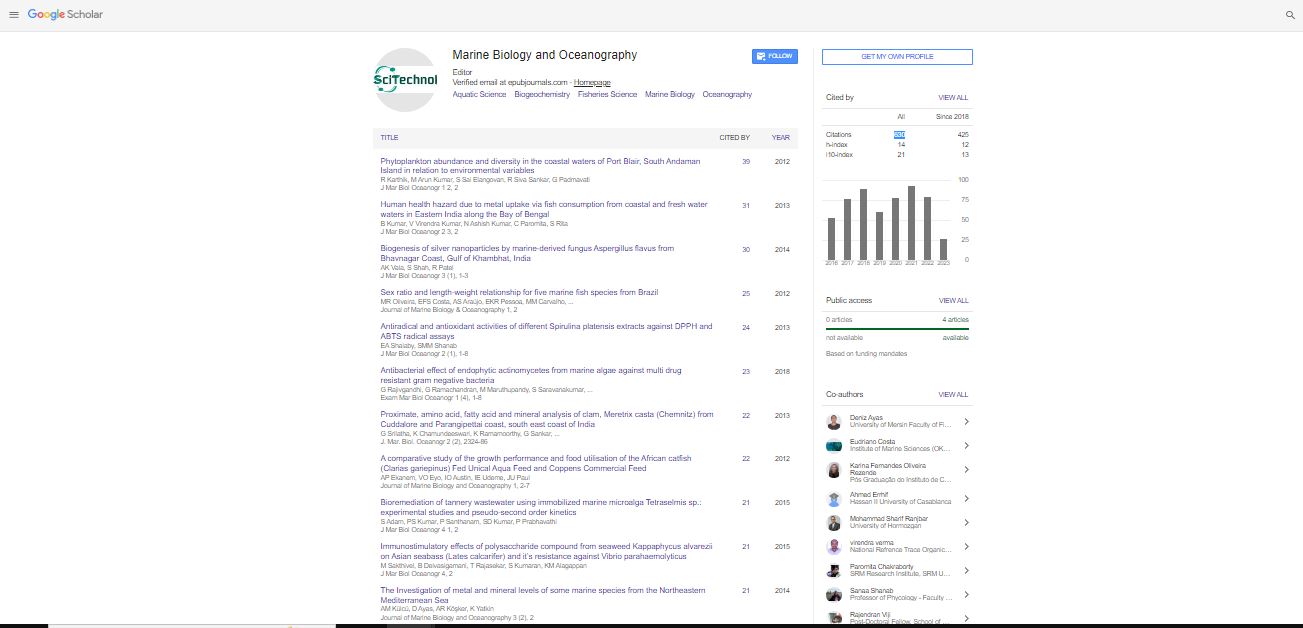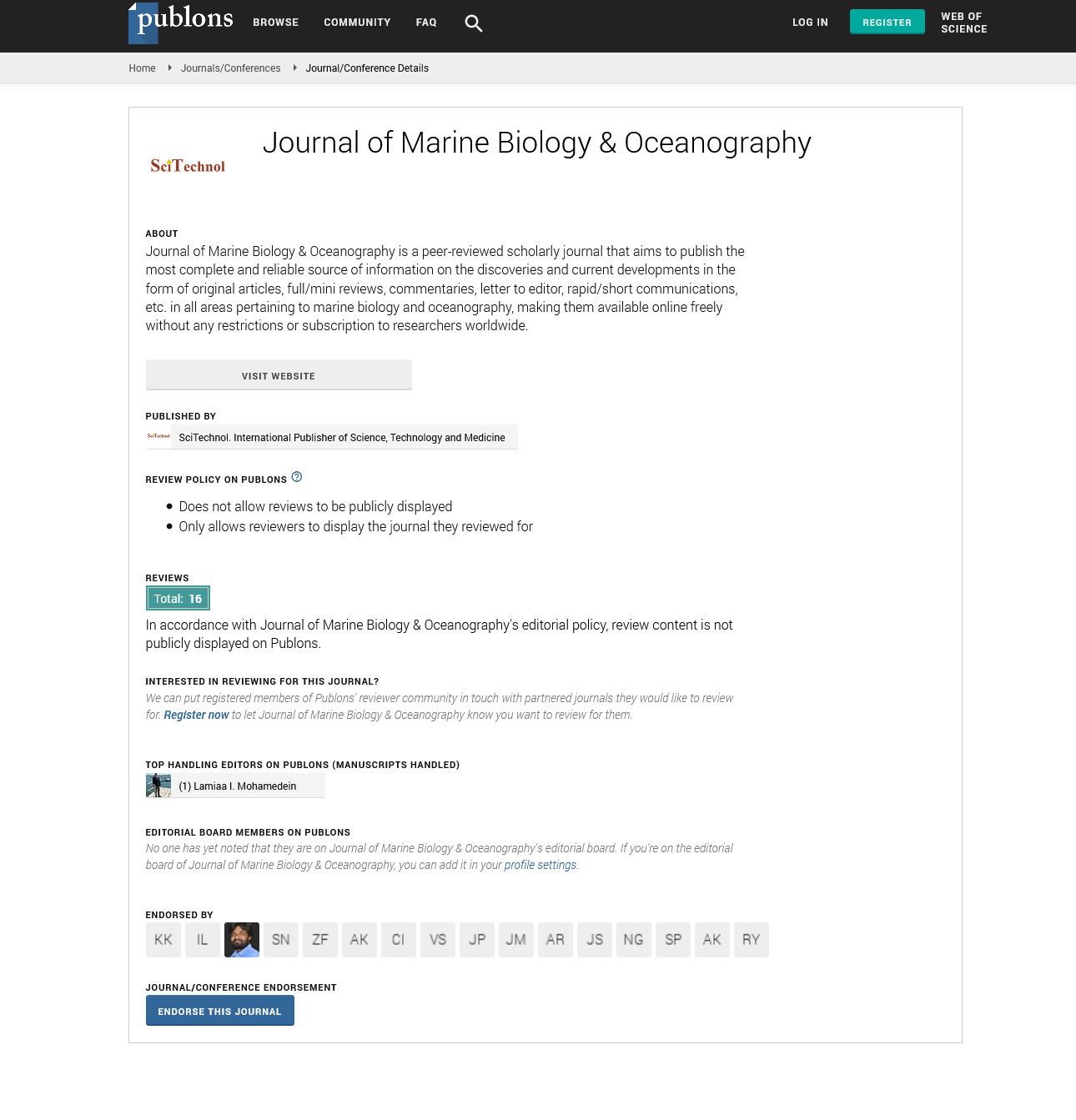Opinion Article, J Mar Biol Oceanogr Vol: 12 Issue: 1
Marine Ecosystems in Chemical Balance: A Study of Marine Chemistry
Ariel Pathak*
Department of Pharmaceutical Sciences, Dibrugarh University, Assam, India
*Corresponding Author: Ariel Pathak
Department of Pharmaceutical Sciences, Dibrugarh University, Assam, India;
E-mail: arielpathak@du22.in
Received date: 14 February, 2023, Manuscript No. JMBO-23-95146;
Editor assigned date: 16 February, 2023, PreQC No. JMBO-23-95146 (PQ);
Reviewed date: 03 March, 2023, QC No. JMBO-23-95146;
Revised date: 10 March, 2023, Manuscript No. JMBO-23-95146 (R);
Published date: 20 March, 2023, DOI: 10.4172/2324-8661.1000252
Citation: Pathak A (2023) Marine Ecosystems in Chemical Balance: A Study of Marine Chemistry. J Mar Biol Oceanogr 12:1.
Abstract
Description
Marine chemistry, a multidisciplinary field of science, focuses on understanding the chemical processes that occur in the marine environment. Oceans cover more than 70% of the Earth's surface and play a key role in regulating the planet's climate, supporting diverse ecosystems, and sustaining human livelihoods. The delicate balance of chemical reactions in marine ecosystems is essential for the health and well-being of our planet, and studying marine chemistry provides insights into these complex interactions. Marine ecosystems are dynamic and complex, comprising a wide range of chemical reactions that occur within the water column, sediments, and organisms. These reactions involve various elements, compounds, and ions, including carbon, nitrogen, phosphorus, oxygen, sulphur, and many others. For instance, the biogeochemical cycling of carbon plays an important role in regulating the Earth's climate, as oceans act as a sink for carbon dioxide (CO2), a greenhouse gas that contributes to global warming. Marine chemistry studies the complex interactions between CO2, Dissolved Inorganic Carbon (DIC), and Organic Carbon (OC) in the ocean, which influence the pH, carbonate saturation state, and availability of nutrients for marine organisms. Nutrient cycling is another essential aspect of marine chemistry. Nutrients such as nitrogen and phosphorus are essential for the growth and productivity of marine organisms, including phytoplankton, which forms the base of the marine food web. Understanding the sources, sinks, and transformations of these nutrients in marine ecosystems is important for predicting and managing changes in marine productivity and ecosystem dynamics. For example, excess nutrient inputs from human activities such as agriculture, aquaculture, and wastewater discharge can lead to eutrophication, causing harmful algal blooms, oxygen depletion, and other negative impacts on marine ecosystems.
The chemistry of marine sediments also plays a vital role in shaping marine ecosystems. Sediments act as repositories of nutrients, contaminants, and organic matter, and their composition and biogeochemical processes can influence the distribution and abundance of marine organisms. Marine chemistry investigates the interactions between sediments and the overlying water column, including redox reactions, nutrient release, and the burial and preservation of organic matter. These processes are essential for understanding the cycling of nutrients and pollutants in marine ecosystems and their impact on marine life. Marine organisms, from microorganisms to marine mammals, also have unique physiological and biochemical adaptations that are influenced by marine chemistry. For example, many marine organisms have developed specialized mechanisms to cope with high salinity, low oxygen, and other chemical stresses in their environment. The study of marine chemistry provides insights into the biochemistry and ecophysiology of marine organisms, including their adaptations to the chemical conditions of the marine environment. In addition to understanding natural processes, marine chemistry also examines the impacts of human activities on marine ecosystems. Anthropogenic activities such as pollution from industrial discharges, oil spills, plastics, and other contaminants can have profound effects on marine chemistry and ecosystem health.
Marine chemistry is a diverse and interdisciplinary field of study that plays a vital role in understanding the complex chemical processes that govern marine ecosystems. By investigating the biogeochemical cycling of elements, nutrient dynamics, sediment chemistry, biochemical adaptations of marine organisms, and the impacts of human activities, marine chemistry provides valuable insights into the functioning and health of marine ecosystems.
 Spanish
Spanish  Chinese
Chinese  Russian
Russian  German
German  French
French  Japanese
Japanese  Portuguese
Portuguese  Hindi
Hindi 
